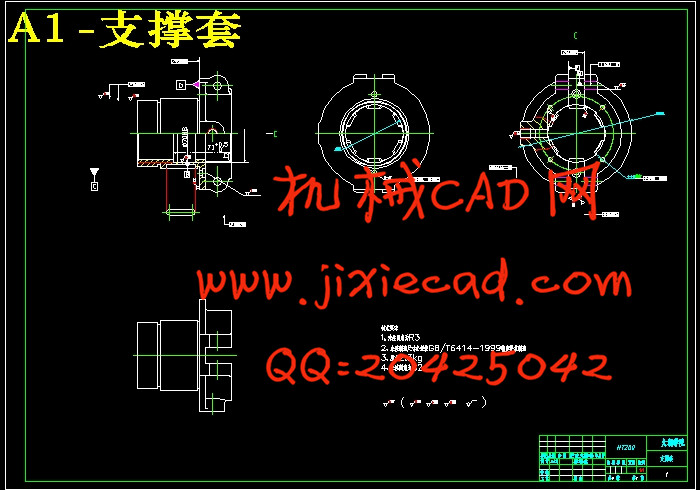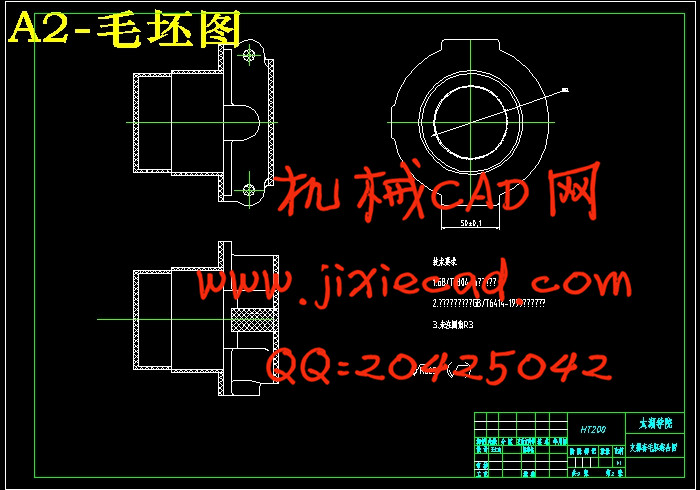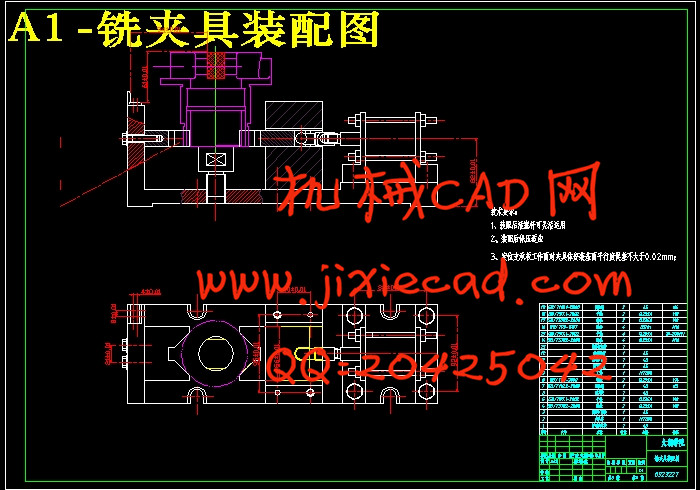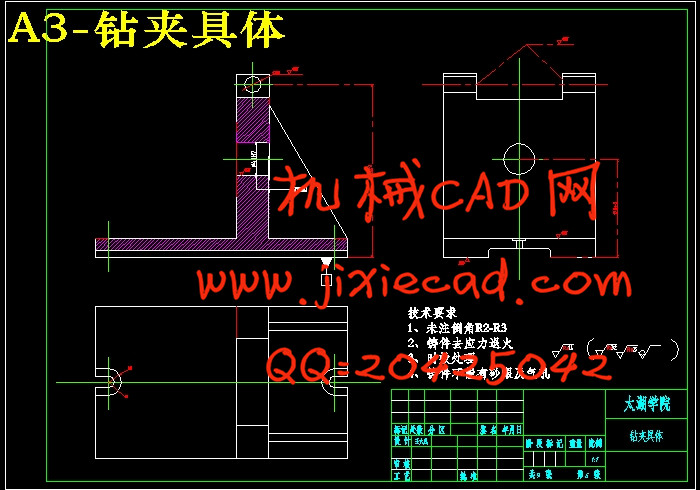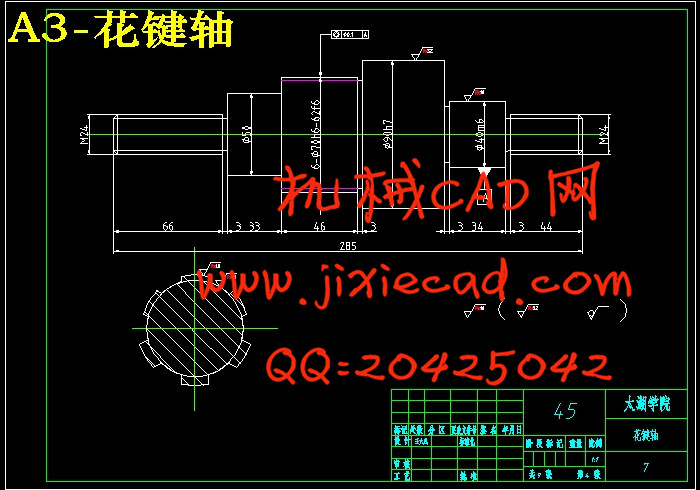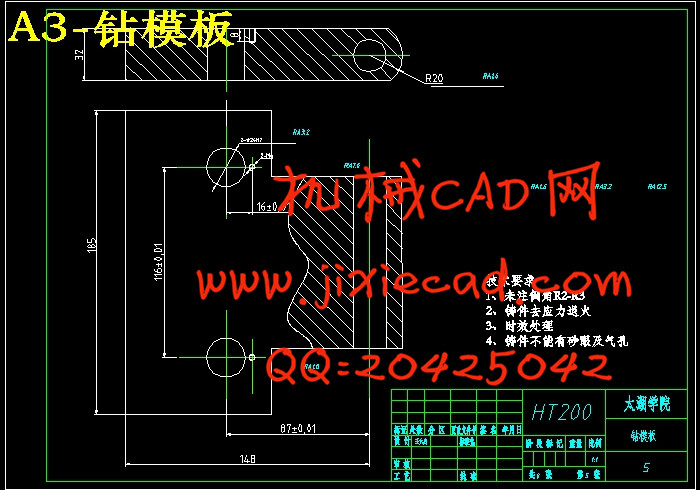设计简介
摘 要
本文是对支承套零件的加工工艺规程进行设计,并针对其中某一道工序进行基于液压的专用夹具设计,并进行了另一工序的普通夹具设计。支承套零件作为套类零件,其主要加工表面是平面及孔。按照机械加工工艺要求,遵循先面后孔的原则,并将孔与平面的加工明确划分成粗加工和精加工阶段以保证加工精度。基准选择以支承套大外圆端面作为粗基准,以支承套大外圆作为精基准,确定了其加工的工艺路线和加工中所需要的各种工艺参数。并按要求对其中一道工序进行了基于液压夹紧的专用夹具设计,在设计中计算了此道工序所受的切削力及切削力矩,进而确定了液压缸的负载,选定整个液压系统的压力,从而确定了液压缸的各参数,绘制了液压夹紧的专用夹具总图。整个加工过程均选用万能机床。
关键词 支承套;加工工艺;液压;专用夹具
Abstract
This article is carries on the design of the supporting sleeve components machine process, and the clamp designed based on the hydraulic pressure which aimed at some working process, and has carried on another working procedure ordinary jig design. The supporting sleeve components take the boom trestle class components, its main processing surface is the plane and the hole. According to the machine-finishing technological requirement, after following the first surface, the hole principle, and is clear about the hole and the plane processing divides the rough machining and the precision work stage guarantees the working accuracy. The datum choice takes the thick datum by the support big outer annulus end surface, takes the fine datum by the support big outer annulus end surface with two craft holes, had determined in its processing's craft route and the processing needs each technological parameter. And according to request to a working procedure has carried on based on the hydraulic pressure clamp unit clamp design. Entire processing process chooses all-purpose machine tool.
Key words: supporting sleeve; processing technic ;special fixture; hydraulic pressure
目 录
摘 要 III
ABSTRACT IV
目录 V
1 绪论 1
1.1本课题的研究内容和意义 1
1.2国内外的发展概况 1
1.3本课题应达到的要求 2
2零件的造型 3
2.1 零件造型软件介绍 3
2.2 零件造型过程 4
3 零件的工艺分析 8
3.1 零件的功用分析 8
3.2 零件的工艺分析 8
4 零件工艺规程设计 9
4.1确定毛坯的制造形式 9
4.2 定位基准的选择 9
4.2.1精基准的选择 10
4.2.2粗基准的选择 10
4.3切削用量的选择原则 10
4.3.1粗加工时切削用量的选择 10
4.3.2精加工时切削用量的选择 10
4. 4 拟定零件加工的工艺路线 11
4.5 机械加工余量、工序尺寸及毛坯尺寸的确定 13
4.6 确定切削用量及基本工时 14
5 专用夹具设计 23
5.1 问题的提出 23
5.2 夹具设计 23
6 基于液压夹紧18H8槽专用夹具设计 26
6.1 设计主旨 27
6.2.1定位基准的选择 27
6.2.2定位误差分析 27
6.2.3 铣夹具设计的基本要求 27
6.3液压缸的设计计算 27
6.3.1 切削力及切削力矩的计算与分析 28
6.3.2 确定系统的工作压力 30
6.3.3确定液压缸的几何参数 30
6.4 确定液压泵规格和电动机功率及型号 32
6.5 确定各类控制阀 33
6.6 管道通径与材料及管接头的选用 34
7 结论与展望 36
7.1结论 36
7.2不足之处及未来展望 36
致谢 37
参考文献 38
本文是对支承套零件的加工工艺规程进行设计,并针对其中某一道工序进行基于液压的专用夹具设计,并进行了另一工序的普通夹具设计。支承套零件作为套类零件,其主要加工表面是平面及孔。按照机械加工工艺要求,遵循先面后孔的原则,并将孔与平面的加工明确划分成粗加工和精加工阶段以保证加工精度。基准选择以支承套大外圆端面作为粗基准,以支承套大外圆作为精基准,确定了其加工的工艺路线和加工中所需要的各种工艺参数。并按要求对其中一道工序进行了基于液压夹紧的专用夹具设计,在设计中计算了此道工序所受的切削力及切削力矩,进而确定了液压缸的负载,选定整个液压系统的压力,从而确定了液压缸的各参数,绘制了液压夹紧的专用夹具总图。整个加工过程均选用万能机床。
关键词 支承套;加工工艺;液压;专用夹具
Abstract
This article is carries on the design of the supporting sleeve components machine process, and the clamp designed based on the hydraulic pressure which aimed at some working process, and has carried on another working procedure ordinary jig design. The supporting sleeve components take the boom trestle class components, its main processing surface is the plane and the hole. According to the machine-finishing technological requirement, after following the first surface, the hole principle, and is clear about the hole and the plane processing divides the rough machining and the precision work stage guarantees the working accuracy. The datum choice takes the thick datum by the support big outer annulus end surface, takes the fine datum by the support big outer annulus end surface with two craft holes, had determined in its processing's craft route and the processing needs each technological parameter. And according to request to a working procedure has carried on based on the hydraulic pressure clamp unit clamp design. Entire processing process chooses all-purpose machine tool.
Key words: supporting sleeve; processing technic ;special fixture; hydraulic pressure
目 录
摘 要 III
ABSTRACT IV
目录 V
1 绪论 1
1.1本课题的研究内容和意义 1
1.2国内外的发展概况 1
1.3本课题应达到的要求 2
2零件的造型 3
2.1 零件造型软件介绍 3
2.2 零件造型过程 4
3 零件的工艺分析 8
3.1 零件的功用分析 8
3.2 零件的工艺分析 8
4 零件工艺规程设计 9
4.1确定毛坯的制造形式 9
4.2 定位基准的选择 9
4.2.1精基准的选择 10
4.2.2粗基准的选择 10
4.3切削用量的选择原则 10
4.3.1粗加工时切削用量的选择 10
4.3.2精加工时切削用量的选择 10
4. 4 拟定零件加工的工艺路线 11
4.5 机械加工余量、工序尺寸及毛坯尺寸的确定 13
4.6 确定切削用量及基本工时 14
5 专用夹具设计 23
5.1 问题的提出 23
5.2 夹具设计 23
6 基于液压夹紧18H8槽专用夹具设计 26
6.1 设计主旨 27
6.2.1定位基准的选择 27
6.2.2定位误差分析 27
6.2.3 铣夹具设计的基本要求 27
6.3液压缸的设计计算 27
6.3.1 切削力及切削力矩的计算与分析 28
6.3.2 确定系统的工作压力 30
6.3.3确定液压缸的几何参数 30
6.4 确定液压泵规格和电动机功率及型号 32
6.5 确定各类控制阀 33
6.6 管道通径与材料及管接头的选用 34
7 结论与展望 36
7.1结论 36
7.2不足之处及未来展望 36
致谢 37
参考文献 38


